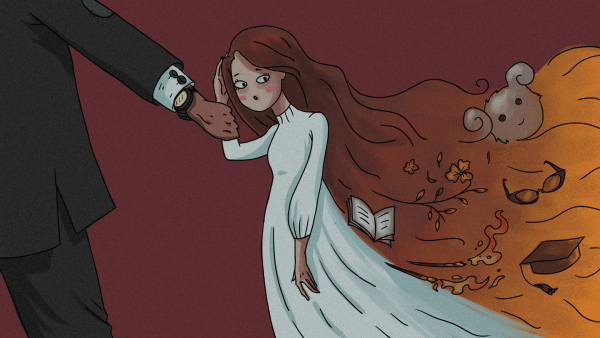By Sara Wahid
These stories are factual and not imagined. They deal with the concealed suffering of eight girls (pseudonyms are used) at children welfare homes, which are defined as: “Sheltering, educational and developmental homes for social welfare.”
According to their own definition, such institutions carry out two main jobs: providing children with a safe environment and offering them welfare in order to set them on the righteous path in life to be productive in society.
But the truth is different. The story of Nasrin Mahmoud started when she moved from ‘Dar Ahbab Allah’ in Al-Ma’adi, Cairo (established in 1993) to ‘Dar Al-Difa’ Al-Ijtimai’ in Al-Mansoura (established in 1985). She lived there for four years, before the home received a 17 years older man called ‘H. A’, who made several attempts to marry her. To this end, the welfare home exerted various pressures on Nasrin (to accept the new groom), still 15 years old at the time. It reverted to getting Nasrin issued with a new ID from the Ministry of Health to show that she was two years older, benefitting from Egypt’s ‘tasnin’ (an age estimation) practice.
The marriage took place without official documentation, according to a customary marriage contract signed at a lawyer’s office with the welfare home’s knowledge. Nasrin left the children home in Al-Mansoura with a memory full of pain and a dossier holding the donations she had received while there. She went to a small room in ‘Haret Jad’ north of Al-Mansoura, where her unemployed and drug addicted husband tortured and rebuked her.
Five years later, she got separated from ‘H. A’ and tried to return to her initial welfare home ‘Dar Ahbab Allah’ in Al-Ma’adi, but they refused to receive her. With the help of some kids in the home, she managed to sneak in and stay there undetected for 7 months when she met ‘Shadi’ whom she married for 3 month as he was convicted and imprisoned for drug dealing. Nasrin returned to the center ‘Dar Ahbab Allah’, this time pregnant with a baby girl. She has been living there with her newborn by the time this feature article was completed.
Less than 10 kilometers away from ‘Dar Ahbab Allah’ is ‘Dar Al-Hidaya’, in Al-Sayyeda Zainab neighborhood in Cairo. There lived Sawsan, 16. The welfare home married her off to a man two years older. On a cold winter night, she moved in with him, where his mother and two other women tied her up to a bed before her husband deflowered her. This has caused a rupture and severe bleeding in her womb, according to ‘Al-Munira’ Government Hospital.
Eight years later, Sawsan, now with a six years old son and was about to give birth when her husband divorced her in June, 2018. She found herself in worn out clothes in the streets. She went back to the home that married her off, but the manager there insisted that she stayed the night but had to leave in the morning.
The stories of Nasrin and Sawsan, together with others that we documented, led us to investigate how underaged girls are married off at Egyptian orphanages. Women’s Center for Guidance and Legal Awareness, which works on enhancing women’s conditions in Egypt, discovered 10 child marriage cases at orphanages in the last three years, according to the center’s director, Reda El-Danbouki, who said children are married off in customary contracts, while laws forbidding child marriage are absent. El-Danbouki referred to Article 227 of Egypt’s Penal Code, which punishes those who witness, attend or document marriages of people less than the legal age (18 years) with two years in jail or an EGP 300 fine without imprisonment.
Reda El-Danbouki, manager of Women’s Center for Guidance and Legal Awareness
Nowadays, orphanages in Egypt find in marrying off girls an “interest,” according to Hiba Ashmawy, founder and head of Friends and Family for Welfare and Development of Orphanages. She said many officials in this sector want to have as many marriages as possible concluded to guarantee their jobs are viable and to ensure more donations in light of their achievements in finding husbands for the girls.
Hiba Ashmawy: founder and head of Friends and Family for Welfare and Development of Orphanages
Meanwhile, Sabri Othman, director of the Child Helpline at the National Council for Motherhood and Childhood, confirmed that the center received complaints about child marriage cases in orphanages. The center reported these incidents to the Ministry of Social Solidarity, so that legal measures could be taken, in accordance with Article 96 of the Egyptian Child Law No. 126 of 2008, which prohibits endangering the life of a child, and penalizes who put a child’s life at risk with six months in prison and a minimum fine of EGP 2,000 that could go up to EGP 5,000. Egypt has so far not had a law criminalizing child marriage, as Othman says.
The Ministry of Social Solidarity, through Mahmoud Shaaban, the director general of family and child affairs at the ministry, denied receiving any notifications about orphanages marrying off underage girls. Only five to 10 percent of girls at orphanages are married, he said.
Mahmoud Shaaban, director general of family and child affairs at the Ministry of Social Solidarity, inside the Sources file.
Behind the Walls
An investigation into how the orphanages included in this feature marry girls off has found that this process is divided into several stages that ignore the girl’s age – all documented cases in this investigation are for girls who were less than 18 when they were married off. It all starts with inducing the child with all sorts of seductions and ends with a detailed agreement between the home’s administration and the supposed groom. The home, as stated by law, informs the Ministry of Social Solidarity, which assist in completing the marriage regardless of girl age.
But in all our documented cases, the return of girls to homes after divorce wasn’t allowed. This led us to dig into academic studies evaluating o the role of social welfare institutions in securing family security for orphans they host; this was carried out by Al-Fayoum University. The research showed that 78.7 percent of its sample orphans didn’t get necessary welfare at the orphanages after a social problems had happened.
A General Overview
The number of underage girl marriages in Egypt exceeded 117,000. Such marriages happen without identification papers, according to the Central Agency for General Mobilization and Statistics 2019.
There’s no clear mechanism to identify child marriages in Egypt; El-Danbouki told us that child marriage cases are detected through social media. We asked the head of the Marriage Officials Association, Islam Amer, about the marriage registration mechanism. He said child marriages are registered in two ways: Age estimation or ‘tasnin’ (as it is referred to locally); that is, presenting the child to a health inspector to assess her age – as in the case of Nasrin and others; the inspector would add two to three years to her age as stated by the orphanage’s documents to guarantee approval of marriage paperwork.
The other way is to have a customary marriage, which is carried out by a lawyer, a mosque imam, or a marriage official; the girl is married off without a marriage certificate. Years later, the underage girl faces two choices to prove the civil marriage. The customary marriage is approved with the husband’s consent when the girl is 18, or the girl is forced to file a marriage confirmation lawsuit if the husband refuses to approve the customary marriage. The second choice was seen in some of our documented cases.
According to Amer, Egypt’s laws ban child marriage documentation but doesn’t criminalize the marriages themselves. Hence, no marriage records are to be found at the Civil Register for people who are less than 18, and the marriage official commits an offence when he officially documents marriage contracts of underage people, but the law doesn’t hold him responsible for carrying out the marriage itself.
We contacted Egypt’s ‘Dar Al-Ifta’ (the highest religious authority) to enquire about sharia rulings concerning child marriage, but the religious institution refused to issue a fatwa (religious opinion) on the matter (by the time this feature was completed). It said a bill on the matter is being debated in Parliament. But we searched the institution’s official website and found an earlier fatwa banning child marriage “because it leads to many disadvantages and harms in society.”
To understand more the psychological conditions of girls under 18, we sought a medical opinion. Dr. Attia Abul-Naga, a consultant gynecologist and obstetrician, said, “The issue isn’t only related to puberty; it exceeds it to psychological and social considerations, which determine the child’s relationship with the opposite sex. The girl herself is suddenly responsible for a family and having duties to fulfill to a partner.”
Whose Responsibility?
We took all the details we gathered about Nasrin’s case to the director of the social welfare institutions in Al-Mansoura, Walid Mahmoud, who denied Nasrin’s story. He said she escaped from the home and got married when she was 18, not 14 as she claims, but he admitted that she was at the welfare home when she got married when presented with the marriage approval document, which includes the institution’s address. He said he wasn’t at his post when the marriage happened, seeking to avoid legal responsibility.
Sawsan’s case was also followed up by the investigation’s team; she was married off by ‘Dar Al-Hidaya’ for Orphan Welfare. We got reports about her suffering psychological and physical traumas for being married off while still a child. This led us to talk with Sheikh Mohammad Qotob, director of the home in Al-Sayyeda Zainab neighborhood in old Cairo. In an upset tone, the sheikh denied that the home marries girls off before they are 18, stressing that it follows Egyptian laws and is always ready to receive back any girl who faces social conditions such as divorce. Sawasn’s story refutes these claims.
Other Opponents of Child Marriages
While looking for voices against child marriage, we found the case of Amal Mohsen at ‘Dar Al-Aman’ in the Giza Governorate. The home is run by the privately-owned Egypt Association for the Protection of Women and Children. In 2014, Amal was 17 and preparing for her middle school exams, having fallen behind in her schooling at an earlier stage.
Amal, who was dreaming to complete her studies, found herself at the office of the welfare home’s director, Camelia Kamel, who told her of plans to marry her off two months later. Amal sought help from the psychologist, Hana’ Hashem, who followed up on her case and condition. Hashem told the investigating team that the home’s director didn’t respond to her calls to stop the marriage. The psychologist filed a complaint with the National Council for Childhood and Motherhood.
The home’s director responded by forbidding the psychologist from entering the institution. Hashem filed complaints with Al-Ajouza police station about her being refused entry to the welfare home, and reported the incident officially in the Al I’ilam station prior to opening a law suite with the office of the Public Prosecutor. The case ended with the psychologist’s dismissal, while the director is still in her position (by the time this feature was completed).

Other Storylines
As we said in the beginning of the article, there are eight cases that we documented and followed up. For journalistic ethical reasons, we have to mention some here. We’re ready to present the other cases to related authorities if required to do so.
First: B. F., 17, was threatened by Mohammad Ismail, director of ‘Dar Al-Akhawayn’ in Misr Al-Jadida neighborhood, to have a bully deface her with nitric acid if she refused to marry Othman, 70. She filed a complaint with Misr Al-Jadida’s police station reporting coercion to marry an elderly man. She also claimed that the director harassed her and other girls at the home. When we followed up this case, we discovered that a court has found Ismail guilty and sentenced him to two years in prison. The girl wasn’t married off.
Two: S. F., 16, at My Children Association for Orphan Welfare, Al-Ma’adi, was married off to Y., who was four years older and lived in the home’s boys section. After the marriage, completed at a lawyer’s office without official documentation, the home didn’t give the couple a flat in violation of bylaws of such associations. The couple rented out a flat in Cotsica, in Al-Ma’adi, a move that proved unaffordable for the husband. They also didn’t get official marriage documentation because the wife was underage.
These conditions complicated their married life; Y. divorced S. F. more than 10 times but only verbally and every time he justified going back on the divorce.
Our stories, which the feature team managed to gather, follow up and investigate, are numerous. What’s happening behind closed doors in many children welfare homes violates laws and the sharia. It also had negative impacts on the girls and their futures. Documentation shows that they were transformed into some sort of commodity that’s sold and bought in clear violation of Egyptian laws and international charters signed by Egypt – all of which set the age of adulthood at 18.
This investigation was conducted with the support of Arab Reporters for Investigative Journalism Network (ARIJ).
The views expressed in this article do not necessarily reflect those of Al Bawaba News.










